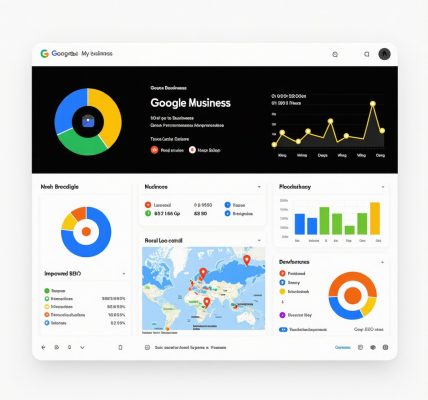Unveiling the Power of GMB Keyword Research: Why It Matters More Than You Think
In today’s ultra-competitive local digital landscape, mastering Google My Business (GMB) keyword research is no longer optional — it’s an indispensable strategy for businesses aiming to dominate local search results. Unlike conventional SEO, GMB keyword research demands a sharp focus on hyperlocal intent and consumer behaviors that drive foot traffic and online conversions. This article dives deep into a step-by-step guide that reveals how to harness this potent tool effectively, optimizing your business profile for maximum local visibility and engagement.
Mapping the Terrain: Identifying Hyperlocal Search Terms That Drive Real Customers
Keyword research for GMB profiles begins by understanding your target audience’s language — their queries, concerns, and preferences. Start by analyzing your business’s core services and locations it serves. Tools like Google’s Keyword Planner, Google Trends, and even Google Maps auto-suggestions can reveal valuable phrases your potential customers use. For example, a local bakery might discover terms like “best sourdough near me” or “artisan bread delivery [city name].” This micro-targeted approach ensures your profile speaks directly to the immediate needs of your community.
How can businesses effectively prioritize keywords for Google My Business optimization?
Prioritization hinges on a balance between search volume, relevance, and competition. High-volume keywords with local modifiers (e.g., city or neighborhood names) often produce the best ROI. Expert practitioners recommend creating a keyword matrix — categorizing keywords by intent (informational, transactional, navigational) and difficulty. Incorporate variations naturally into your GMB business description, services, and posts. Remember, Google’s algorithm favors authenticity and user experience, so keyword stuffing is counterproductive.
Moreover, leveraging insights from tools like SEMrush’s authoritative analysis on local SEO can provide a strategic edge by highlighting competitor keyword strategies and search trends.
Crafting Your GMB Profile: Integrating Keywords Without Losing Authenticity
Once you’ve pinpointed your keyword set, the next step is seamless integration into your profile. The business name, description, services list, FAQs, and posts are prime real estate. However, keyword placement should enhance clarity and user engagement rather than detract from it. For instance, instead of a robotic phrase like “We provide plumbing services,” try “Expert plumbing services in downtown Seattle, ensuring fast and reliable repairs.” This approach subtly weaves your keywords while keeping the narrative customer-centric.
Leveraging Advanced Techniques: Beyond Basic Keyword Insertion
Successful GMB optimization also involves advanced tactics such as tracking keyword performance via Google Business Profile Insights, regularly updating your profile based on trending local queries, and combining keyword research with review management strategies. For example, encouraging customers to mention specific services or locations in their reviews can organically boost keyword relevance and local authority. This dynamic approach transforms your GMB profile into a living asset that adapts to evolving search behaviors.
For those eager to deepen their expertise, exploring resources like how to use GMB keyword research for better search ranking in competitive areas offers comprehensive tactics tailored to complex local markets.
Engage and Expand: Your Call to Action
Have you experimented with GMB keyword research to optimize your business profile? Share your experiences or challenges in the comments below — your insights might help fellow local entrepreneurs sharpen their local SEO strategies. For a deeper dive into optimization techniques, check out our guide on how to optimize your Google Business listing effectively.
Real-Life Lessons from My Journey with GMB Keyword Strategies
Reflecting on my own experience optimizing Google My Business profiles, I quickly realized that theory and practice often diverge. Early on, I poured hours into keyword research, stuffing every conceivable local term into descriptions and posts. But the results were underwhelming — little improvement in rankings and minimal engagement. It was only when I stepped back to focus on user experience and authenticity that things shifted. For example, rewriting a business description to naturally include “affordable family dentistry in Austin” instead of a blunt keyword dump not only improved rankings but also increased customer inquiries. This lesson reinforced that GMB optimization is a blend of art and science — data-driven strategies combined with genuine storytelling.
Tracking Success: How to Use Google Business Profile Insights Wisely
One of the game-changers in my optimization efforts has been regularly monitoring Google Business Profile Insights. These analytics provide valuable clues about which keywords and queries drive traffic and actions on your profile. For instance, noticing a spike in searches for “emergency locksmith near me” prompted me to create timely posts emphasizing 24/7 availability and service areas, which translated into tangible leads. I learned that staying proactive by adapting content based on insights can keep your profile relevant and competitive in local search results.
What are the common pitfalls to avoid when updating your GMB profile regularly?
From my observations, many businesses make the mistake of neglecting consistent updates or over-optimizing in ways that appear spammy. Avoid repeating keywords unnaturally or publishing irrelevant posts just for the sake of activity. Instead, focus on adding value — share real promotions, customer stories, or community involvement that resonate locally. Another trap is ignoring negative reviews; addressing them thoughtfully can enhance trust and inject natural keywords through authentic dialogue. Remember, Google prioritizes profiles that engage meaningfully with their audience.
Integrating Reviews into Your Keyword Strategy: A Personal Take
Incorporating customer reviews into your GMB keyword approach has been a revelation for me. Encouraging satisfied clients to mention specific services or locations enriches your profile’s keyword diversity organically. For example, a landscaping business I assisted received reviews highlighting “affordable lawn care in downtown Chicago,” which helped boost search rankings for those terms. This aligns with findings from Moz’s local SEO research emphasizing the power of reviews for local search prominence. One tip I always share is to respond to reviews promptly and naturally — it’s a two-way street that benefits both SEO and customer relationships.
Putting It All Together: Practical Next Steps
If you’re ready to elevate your local SEO game, start by conducting a thorough keyword audit of your GMB profile. Then, integrate these keywords thoughtfully across descriptions, services, and regular posts. Use insights to refine your approach and actively manage reviews to harness their SEO potential. For detailed strategies, you might want to explore mastering Google Business listing SEO with proven content updates. Remember, local SEO is a marathon, not a sprint — consistency and authenticity pay off over time.
Have you encountered unexpected challenges or successes with your GMB keyword strategy? I’d love to hear your stories and tips in the comments! Sharing experiences helps all of us grow stronger in the competitive local market.
Leveraging Data-Driven Insights: The Untapped Potential of Google Business Profile Analytics
While many businesses perform keyword research initially, few exploit the full power of ongoing data analysis available through Google Business Profile Insights. This platform offers granular details such as the specific queries users enter before interacting with your listing, how they find your business, and which actions they take afterward. By cross-referencing these insights with your keyword strategy, you can identify emerging local search trends and adjust your content dynamically.
For instance, if Insights reveal increasing searches for “eco-friendly pest control services” in your neighborhood, integrating this exact phrase into your GMB posts and FAQs can capture that rising demand. This adaptive optimization serves as a continuous feedback loop, sustaining relevance and competitive edge. The key is to establish a routine of reviewing these metrics monthly, enabling proactive content pivots rather than reactive corrections.
How can integration of customer-generated content extend the reach and authenticity of GMB keywords?
Customer-generated content, especially reviews and Q&A interactions, presents a rich reservoir of natural language keywords that enhance local SEO authenticity. Encouraging clients to describe their experiences including specific services, locations, or unique selling points can diversify your keyword footprint without artificial stuffing. For example, a remodeling company might find clients mentioning “custom kitchen remodeling in Brooklyn Heights,” which adds hyperlocal specificity to the profile.
Moreover, engaging with these reviews by responding thoughtfully not only builds customer trust but also creates additional keyword-rich content. Google’s algorithm favors active profiles that demonstrate responsiveness and community engagement, which can elevate your ranking in local pack results.
Strategic Review Management: Transforming Feedback into SEO Advantages
Review management is no longer solely about reputation but also an integral part of keyword strategy. When customers mention unique product features or neighborhood names, these become valuable SEO signals. Businesses should implement systems to guide customers subtly toward mentioning keywords naturally—for instance, by prompting reviews that highlight particular services or locations.
Additionally, responding to negative reviews professionally and incorporating relevant keywords into your replies can mitigate reputational risks while reinforcing your keyword presence. This dual-purpose strategy leverages organic language that resonates both with search algorithms and prospective customers.
Advanced Optimization Tactics: Combining Semantic Search and Latent Keyword Targeting
Modern search engines increasingly rely on semantic understanding rather than mere keyword matching. This means that optimizing your GMB profile should include latent semantic indexing (LSI) keywords and topical clusters that support your primary terms. For example, alongside “family dentistry Austin,” including related phrases like “pediatric dental care,” “teeth cleaning,” and “orthodontics near downtown” builds topical authority and relevance.
Employing tools like Google’s Natural Language API or third-party semantic analyzers can help identify these related terms. Integrating these into your GMB posts, Q&A, and service descriptions enriches your profile’s content depth, making it more resilient against algorithm updates and improving user engagement.
According to a detailed study by Search Engine Journal, semantic SEO strategies significantly improve local search rankings by addressing user intent more comprehensively.
Future-Proofing Your GMB Keyword Strategy: Embracing Voice Search and AI Trends
With the rise of voice-activated searches and AI-driven assistants, GMB keyword research must evolve beyond traditional typed queries. Voice searches tend to be more conversational and question-based, such as “Where can I find affordable vegan restaurants near me?” or “Who offers 24-hour emergency plumbing in Midtown?” Integrating these natural language queries as keywords within your GMB content can capture this emerging traffic.
Preparing for this shift involves creating FAQ sections and posts that mirror how people speak rather than just what they type. This anticipatory approach aligns your profile with future search behaviors, ensuring sustained visibility.
Are you leveraging the full spectrum of data insights and customer interactions to refine your GMB keyword strategy? Engage with our expert community or explore our advanced guides to elevate your local SEO game further.
Unlocking AI-Driven Semantic SEO: The Next Frontier in GMB Optimization
In the evolving landscape of local search, integrating advanced AI-powered semantic SEO techniques into your Google My Business (GMB) keyword strategy is swiftly becoming a game changer. Beyond traditional keyword stuffing, this approach leverages artificial intelligence to understand user intent, context, and nuanced language patterns, enabling businesses to tailor their profiles with precision. By utilizing AI tools to analyze search intent and semantic relationships, you can craft content that resonates profoundly with both search algorithms and local consumers, elevating your visibility and engagement exponentially.
Maximizing Latent Semantic Indexing (LSI) for Superior Local Relevance
Latent Semantic Indexing (LSI) keywords are conceptually related terms that complement your primary keywords, enriching your GMB profile’s topical depth and enhancing its search engine comprehension. For instance, if your business focuses on “organic skincare in San Francisco,” incorporating LSI terms like “natural beauty products,” “chemical-free moisturizers,” and “eco-friendly face care” diversifies your semantic footprint. This strategy helps capture diverse but relevant search queries, making your profile more adaptable to varied user intents and improving rankings in local pack results.
How can AI-driven semantic analysis refine the identification of effective LSI keywords for GMB profiles?
AI-driven semantic analysis uses natural language processing (NLP) to dissect vast volumes of local search data, pinpointing contextually relevant terms that human analysis might overlook. Tools powered by Google’s Natural Language API or IBM Watson can automatically extract LSI keywords by evaluating search patterns and user queries specific to your locality and industry. This granular understanding allows marketers to integrate nuanced phrases that align with evolving search behaviors, resulting in a dynamic and contextually rich GMB profile. Furthermore, AI can continuously monitor keyword performance and suggest adaptive modifications, ensuring your strategy remains cutting-edge and responsive.
Leveraging Authoritative Insights: A Deep Dive into Semantic SEO Best Practices
For a comprehensive understanding of semantic SEO integration with local business profiles, Moz’s Semantic SEO Guide offers an authoritative resource. It details how semantic search enhances relevancy signals and user satisfaction by emphasizing intent and topic clusters over isolated keywords. Implementing these insights in your GMB optimization can differentiate your profile amidst increasingly sophisticated local search algorithms.
Mobilizing Voice Search Optimization Through Conversational Keyword Integration
With voice search rapidly gaining traction, optimizing GMB profiles for conversational queries is imperative. Voice searches tend to be longer, question-based, and context-rich, mirroring natural human dialogue. Embedding FAQs and posts that address specific voice search patterns—such as “Who offers gluten-free dining options near me?” or “What are the business hours for emergency pet care in downtown?”—can significantly increase your chances of appearing in voice search results and featured snippets.
Call to Action: Elevate Your Local SEO Mastery Today
Ready to transcend conventional GMB keyword strategies and embrace the transformative power of AI-driven semantic SEO? Connect with our expert community to exchange insights, access cutting-edge tools, and implement proven techniques that future-proof your local search presence. Engage now to unlock unparalleled local visibility and deepen your connection with the community you serve.

Frequently Asked Questions (FAQ)
What is the difference between general SEO keyword research and GMB keyword research?
General SEO keyword research targets a broad audience and often focuses on global or national search volumes, while Google My Business (GMB) keyword research zeroes in on hyperlocal, intent-driven queries specific to geographic locations. GMB research emphasizes keywords that drive foot traffic, calls, and local engagements, requiring a more nuanced understanding of community language and consumer behavior.
How do I identify the best local keywords for my GMB profile?
Start by analyzing your core services and the specific neighborhoods or cities you serve. Use tools like Google Keyword Planner, Google Trends, and Google Maps autocomplete suggestions to uncover local search phrases. Additionally, review customer reviews and questions to extract naturally used terms. Prioritize keywords that balance search volume, local relevance, and competition.
Can keyword stuffing harm my Google My Business ranking?
Yes, keyword stuffing can negatively impact your ranking and user experience. Google’s algorithms prioritize authentic, user-centric content. Keywords should be integrated naturally into your business description, services, and posts to enhance clarity and engagement without appearing manipulative or spammy.
How often should I update my GMB profile with new keywords or content?
Regular updates are essential but should focus on value and relevance. Monthly reviews of Google Business Profile Insights can reveal trending local queries, enabling you to adapt your content dynamically. Avoid irrelevant or repetitive posts; instead, share genuine promotions, community stories, and timely information that resonate with your audience.
What role do customer reviews play in GMB keyword strategy?
Customer reviews are a powerful source of natural, diverse keywords. Encouraging clients to mention specific services, locations, or unique selling points enriches your profile’s semantic footprint. Responding thoughtfully to reviews also generates additional keyword-rich content and demonstrates engagement, which Google favors.
How can I leverage AI and semantic SEO for my GMB profile?
AI-driven semantic SEO involves using tools that analyze user intent and related terms (LSI keywords) to create rich, contextually relevant content. This approach helps your profile address a broader range of queries and improves resilience against algorithm changes. Incorporating related phrases and conversational language, especially for voice search, enhances your local relevance.
What are latent semantic indexing (LSI) keywords and why are they important?
LSI keywords are conceptually related terms that support your primary keywords, helping search engines understand the context and topical relevance of your content. Including LSI keywords in your GMB profile broadens your reach across diverse but related local search queries, improving your chances of appearing in relevant search results.
How do voice searches impact GMB keyword research?
Voice searches tend to be longer, more conversational, and question-based. Optimizing your GMB profile with natural language queries, FAQs, and posts addressing common voice search questions increases the likelihood of appearing in voice search results and featured snippets, capturing this growing segment of local search traffic.
What common pitfalls should I avoid when managing keywords in my GMB profile?
Avoid neglecting profile updates, keyword stuffing, publishing irrelevant content, and ignoring negative reviews. Instead, maintain authenticity, engage meaningfully with customers, respond to feedback, and integrate keywords naturally to build trust and improve local SEO performance.
How can I measure the success of my GMB keyword strategy?
Utilize Google Business Profile Insights to track queries driving traffic, user actions, and engagement patterns. Monitor changes in search visibility, customer interactions, and lead generation over time. Regular data analysis enables you to refine your keyword strategy and adapt to evolving local search trends effectively.
Trusted External Sources
1. Moz’s Local SEO Research and Semantic SEO Guide: Moz provides in-depth, research-backed guidance on local SEO best practices, semantic keyword integration, and how reviews influence local search rankings, helping marketers understand the nuances of GMB optimization.
2. Google Business Profile Help and Insights Documentation: Google’s official resources offer essential information on managing profiles, interpreting performance data, and applying recommended keyword strategies aligned with platform updates.
3. Search Engine Journal’s Semantic SEO Articles: SEJ delivers expert analysis on semantic SEO trends, AI integration, and voice search optimization, offering actionable tactics tailored for local businesses aiming to enhance GMB profiles.
4. SEMrush Local SEO Blog and Tools: SEMrush provides competitive analysis tools and keyword research insights specifically for local SEO, facilitating strategic keyword prioritization and competitor benchmarking.
5. IBM Watson Natural Language Processing Resources: IBM Watson’s NLP technologies enable advanced semantic analysis, supporting AI-driven identification of latent semantic keywords and intent-based optimization for nuanced GMB content creation.
Conclusion
Effectively mastering Google My Business keyword research is a cornerstone of commanding local search visibility in today’s competitive marketplace. By focusing on hyperlocal, intent-driven keywords, integrating them authentically into your profile, and leveraging advanced AI-powered semantic SEO techniques, you create a dynamic and engaging presence that resonates with both search engines and your community. Regularly analyzing Google Business Profile Insights and incorporating customer-generated content further enhances your profile’s relevance and authority. Embracing voice search optimization and continuous adaptation ensures your local SEO strategy remains future-proof. Harness these expert strategies to elevate your GMB profile, attract qualified leads, and build lasting local connections. Share your experiences, explore advanced tactics, and keep refining your approach to stay ahead in the evolving local search landscape.


